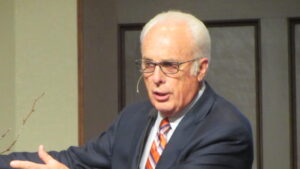My friend said something to me over breakfast that has been rattling around my old cerebrum ever since. We were talking about how different generations have approached raising Christian children and he said this about the approach of our parents: “It feels like they wanted to teach us only enough theology to sustain a personal spiritual life, and no more.”
We might call this the theologically minimalist approach.
There were plenty of exceptions, but in the broadly evangelical world, I think it was the norm rather than the exception. The important thing was to accept Christ as your personal Lord and Saviour. After that, we had some notions of personal piety like daily quiet time, but not much energy was spent setting a theological foundation or developing a compelling vision of Christian maturity.
I discern something similar in the way evangelical Christians often think and talk about parenting in our own day.
Parenting Minimalism
There seems to be an assumption that, beyond teaching the Bible and the gospel to our kids and praying that they come to saving faith, there isn’t much that would differentiate Christian parenting from non-Christian parenting. The content and pedagogy of their education can be pretty well the same; the books they read and shows they watch and music they listen to can be pretty well the same. In short, their actual cultural formation can be pretty well the same. This is a kind of parenting minimalism that actually makes some sense in a context where the broader culture still has strong vestiges of Christian influence, as was arguably the case until not that long ago. It might not have been ideal, but it seemed like it could work out decently well.
But, to be blunt, those days are well behind us. Even as my own generation, the millennials, was being formed and coming of age in the 1990s and 2000s, it became clear that not all was well. The shaping influence of the broader culture was already militating against the spiritual priorities of our parents. We heard the gospel at church (and perhaps at home), but were being shaped more fundamentally by the priorities of our peer groups, the media we took in, and the education we received.
The result? Millennials left the church at a higher rate than any previous generation.
Christian Paideia
As I started having my own children, I began thinking again about education. But education is not really the word I’m looking for. We have this entrenched modern notion that education is what happens during the school day and it relates to what fills the student’s head. It concerns that secular middle space where mathematics, literacy, and (maybe) history are necessary preconditions for gainful employment. That’s how most people think of education today—that thing you need to get a good job. And many Christians, not knowing any better, adopt this view.
We need a better word than education until it can be rehabilitated. One option is formation, which I’ve already used once or twice in this piece, but the problem with that word is how broadly it can be used for unrelated topics, such as industrial processes. Education is too narrow, formation a bit too broad, so let’s just reach over into another bucket—the Greek bucket—and use paideia. This is the word Paul uses in Ephesians when he speaks of raising children in the “nurture [paideia] and admonition of the Lord” (Ephesians 6:4).
The idea here is of a whole-person approach to shaping the next generation. As Joe Rigney puts it, “Paideia is the all-encompassing enculturation and formation of a child into a citizen. Christian paideia, then, is all-encompassing Christian discipleship.” We find this idea clearly described in Deuteronomy 6, where God commands the Israelites to embrace a deeply thorough approach—when you get up, when you sit down, when you walk—to teaching their children.
We tend to think of education as relegated to intellectual knowledge, but paideia includes character formation and virtue as well.
It’s not enough to know what is good and what is true; we must come to love what is good and love what is true. We are now in the realm of the affections, and suddenly the parenting terrain is vast and the task before us utterly daunting. For now we will no longer be satisfied with filling our children’s heads with the information they’ll need to be able to succeed, but we will be aiming at something more profound and therefore more difficult: cultivating knowledge and virtue, right thinking and right feeling, understanding and desires.
Mis-formation
This is one of the main points of C.S. Lewis’s brilliant little book, The Abolition of Man. He saw that modern education was mis-forming the human person in a fundamental way by trying to avoid the question of the feelings, affections, and the desires of the student. This approach came out of a fundamental misunderstanding of what the human person is, which highlights the need for the church to recover a renewed and thoroughly Christian anthropology—or in other words, a pre-modern understanding of the human person.
The modern separation between these two realms, the intellect and the affections, is exactly that: modern. This is why the most dynamic movement in education today is ‘Classical Education.’ It’s not really a “new” approach, it’s a return to the “old” approach that was normative among the educated classes for hundreds of years, the same few hundred years that, with all the usual qualifications about its blatant shortcomings, was the height of Western civilization.
Evangelical Protestants in particular are often ignorant that their beloved gospel-recovering Reformation was born out of a resurgence of classical education (Renaissance Humanism) and gave rise to “schools that promoted Protestant doctrine and introduced classical learning, the prerogative of a select few in late medieval Europe, to an ever-growing percentage of the population.”[1]
Here is the sad reality about modern education. Whatever veneer of secular neutrality it might have once enjoyed, and I think there’s an argument to be made that there was a kind of goldilocks era where it managed something approximating neutrality, the recent unrestrained push for LGBT indoctrination has exposed it as a full-blown alternative paideia that is fundamentally opposed to historic Christian moral thinking. Consider for example the striking testimony of Tim Challies and the interviews he conducted with his own children about their experience in Canadian public schools. The progression from the first interview in 2018 to the last two in 2022 is remarkable; they describe a change of atmosphere in the last decade so significant that his youngest decided in August of 2022 to finish her high school studies at home via an online Christian school.
In other words, I think there was a time when an argument could be made that the public schools provided a neutral kind of education in a pluralistic society that thoughtful Christian parents and churches could supplement with rigorous Christian teaching and formation. That argument seems less persuasive today. Christians parents with children in public schools need to be aware of just how much things have changed, how hostile the environment is to Christian beliefs and practices, and just how much intentionality and energy it will take from them and their church community to continue being the primary worldview and affection-shaping influence in their kids’ lives.
So the question is not whether our children will be formed in mind and heart by some system of beliefs and values, but which system it will be. And I fear that many Christian parents have yet to reckon with this reality.
As I came to these convictions about education, I realized I hadn’t received a very good one. This led me to a kind of ‘Adult Ed remedial classical self-education program.’ I started buying all the classic books I could find at thrift stores and library sales. I took in free online lectures and found guides to help me make sense of Paradise Lost, Dante’s Inferno, Shakespeare, and Sophocles. I dipped my toe into ‘the Great Conversation’ and found it not only enjoyable but paradigm-shifting. I started to grasp, dimly at first, how the great thinkers of the past were necessary for understanding the present. And so I came to a settled conviction that my own children would receive our best effort at this kind of paideia, within the constraints of our life circumstances. To be clear, I’m not arguing here for one mode of education over another; this thicker vision of the formation of our children can be embraced and enacted whether they attend private, public, or home schools.
Educating Affections
I opened this piece with a comment on a blind spot in the parenting approach of a previous generation, but there is no doubt in my mind that my own children will look back and see glaring faults in their own upbringing. Gratitude and honour, not criticism, should be the predominant spirit with which we look upon our forebears. Each generation must do the best it can with what it has.
In God’s providence we find ourselves in a tumultuous and uncertain time, when the received wisdom and public institutions that exist to educate the young are in a low state. But that just means it’s a great time to build anew and shore up what is weak; a great time to rediscover the libertas—freedom—that comes from an education that teaches us to identify and cultivate virtue while eschewing vice. Thankfully we have an abundance of material to choose from in this happy work. And so, in the words of the little boy whom Augustine overheard at the decisive moment of his conversion, I say to you: tolle lege—take up and read!
[1] Aaron C. Denlinger, “The Protestant Reformers and Classical Education,” Credo Magazine, Vol. 15, Issue 2.
























